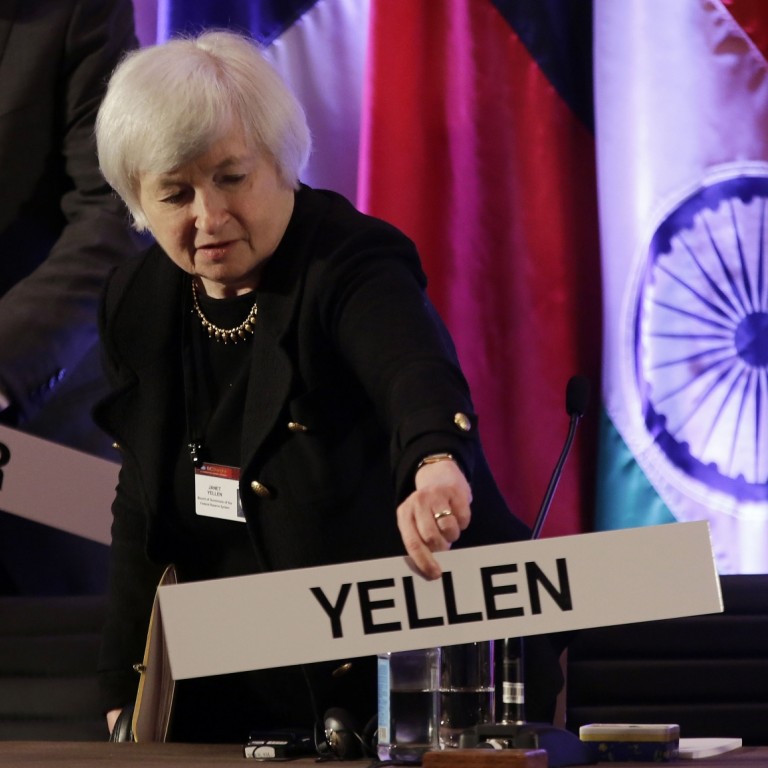
Update | US Fed chief Janet Yellen seen holding dovish bent
Former professor who currently serves as the central bank's deputy chairwoman favours higher employment over lower inflation
Janet Yellen, US President Barack Obama's pick to lead the Federal Reserve, combines a solid reputation as an economist with a keen interest in communication - fitting for someone who once joked that her dinner guests should expect a discussion of economics.
Yellen, a former professor who is currently the Fed's deputy chairwoman, has a reputation as one of the central bank's most employment-focused officials and has also been at the forefront of a communications "revolution" at the once-secretive Fed.
She has been a close ally of chairman Ben Bernanke as he took the central bank further and further into unfamiliar terrain in order to boost the US economy, backing three rounds of bond buying that have swelled the Fed's balance sheet to more than US$3.6 trillion.
Nominated by US President Barack Obama on Wednesday, the white-haired Yellen will be the first woman to head the Fed in its 100-year history.
She played a big role in the Fed's adoption of a 2 per cent inflation target and its decision to treat undershooting and overshooting that target as equally problematic.
Like many Fed officials, Yellen, who counts hiking and cooking among her hobbies, says that ensuring that the public and financial markets understand the central bank's plans is critical in making those policies effective.
"The effects of monetary policy depend critically on the public getting the message about what policy will do months or years in the future," she said in April.
A wise and humane policy is occasionally to let inflation rise
The softly spoken 67-year-old is, by her own admission, willing to tolerate inflation overshooting the Fed's 2 per cent target when faced with uncomfortably high unemployment. "A wise and humane policy is occasionally to let inflation rise even when inflation is running above target," she said in 1995.
In a speech last year, she argued the central bank can achieve the best economic outcome by allowing inflation to exceed the Fed's target for several years to achieve a faster reduction in unemployment, as long as longer-term inflation expectations remain in check.
Yellen, who earned her doctorate in economics from Yale, was the daughter of a Brooklyn doctor who saw patients in the family home. She decided to pursue a career in economics after hearing Nobel prize-winning economist James Tobin speak and being impressed by his combination of academic accomplishment and public service.
Her notes of Tobin's lectures were so exhaustive that students passed them around as study guides. That thoroughness has stayed. Yellen arrives at Fed meetings with carefully researched written remarks, delivering them in measured tones with a slight, somewhat nasal Brooklyn accent that nearly 30 years in California did not fully eradicate.
Yellen's experience in policymaking is as solid as her career in academia, which included teaching at Harvard University and the London School of Economics as well as the University of California, Berkeley. She had two stints as a Fed policymaker before becoming vice-chairwoman, as a board member and as president of the San Francisco Federal Reserve Bank, and headed former president Bill Clinton's Council of Economic Advisers for 2½ years.
Yellen has written extensively about monetary policy, but she has also struck farther afield. One paper, written with her Nobel Prize-winning economist husband George Akerlof, analysed single motherhood, arguing that a rise in out-of-wedlock births was due to a decline in "shotgun" weddings. Yellen met Akerlof when they were both at the Fed in Washington; their wedding was hasty, although only because Akerlof was moving to London and the couple wanted to stay together. They have a son.
Yellen, whose love of gourmet food does not stop her frequenting the Fed's staff cafeteria, joked in 1995 that dinner at her house meant "a diet that is richer in discussions of economics and policy issues".
While Yellen has a reputation as one of the Fed officials most willing to risk higher inflation to bring the jobless rate down, in 1996, she and then Fed governor Laurence Meyer paid a visit to the central bank's chairman, Alan Greenspan, to warn that leaving rates too low for too long could fan inflation.
Although the argument fell on deaf ears, "it tells you that she's prepared to be hawkish when she needs to be", Meyer said.

